Early Years (EY) franchises have been revolutionary in changing the way young children access music. From Little Notes to Monkey Music and beyond, the teams behind these franchises are improving nationwide access to fun, supportive and engaging learning environments, exposing them to the magic of music from a very young age.
Little Notes
One of the largest musical franchises of its kind in the UK, Little Notes was founded in 2005 by Lou Bradbury, who trained at the Royal Academy of Music (RAM) for five years and has worked in professional chamber music groups for 25. ‘It was once I noticed how much my own children were fascinated by live music that the concept of Little Notes was born,’ she says – and it is this connection to live music that is essential to the pedagogy of the franchise.
With her husband, Mark – an opera singer and fellow RAM graduate – Lou launched classes locally in 2005, and they were impressed to discover that the sessions were immediately popular with young families. Almost 15 years later, the Bradbury's continue to lead sessions, while also running the organisation's headquarters, ‘which trains and supports our franchisees, who are all freelance musicians, as well as developing our curriculum,’ Lou tells me.
Little Notes now holds classes across the UK for young children. Lou says that soon after launching local classes, she and her husband were approached by other musicians who wanted to run Little Notes within their own local areas. ‘So we developed a franchise programme to train, equip and support highly-trained musicians to run their own businesses and deliver the Little Notes curriculum.’
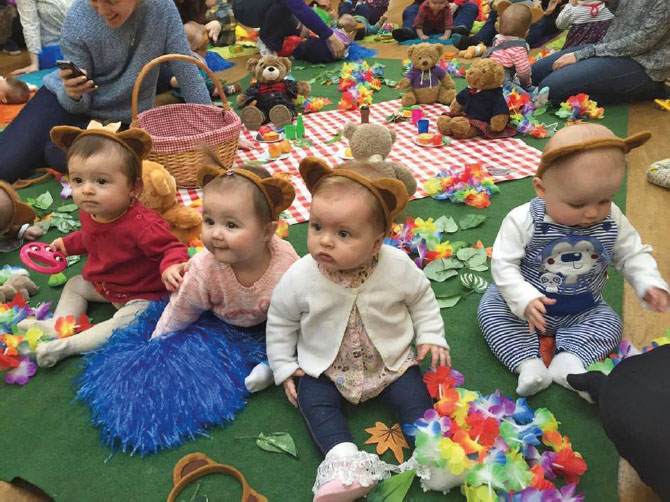
Bear with it: Babies make good Music Bugs too (Image: Andrew Kelly Photography)
The classes delivered in the Little Notes model are delivered only by conservatoire-trained, professional musicians, using their instruments as a key tool throughout the class. ‘A typical 40-minute session would involve lots of fun vocal and physical activities for the adults and kids alike; Little Notes is very much an activity for the whole family,’ says Lou. ‘We explore a piece of music using movement or hand-held percussion or other stimuli, and lots of singing – we love to sing at Little Notes!’
Participating families of Little Notes classes are grouped together according to the age of their children. The curriculum features sessions for pregnant families and those with newborn babies, and these classes focus on enjoying music together as a family – which is a wonderful way to introduce music into the life of a child, presenting it in a way that brings it into the everyday routine, instilling that creativity that thrives in the early stages of development.
The curriculum grows with the children, too, becoming more ‘age-appropriate’, as Lou puts it. ‘For example, our toddler classes are very, very active, with quite a strong focus on developing listening skills. By the pre-school year, the focus is on encouraging the children to develop expressive voices and to share their thoughts and ideas on the music we create and listen to.’
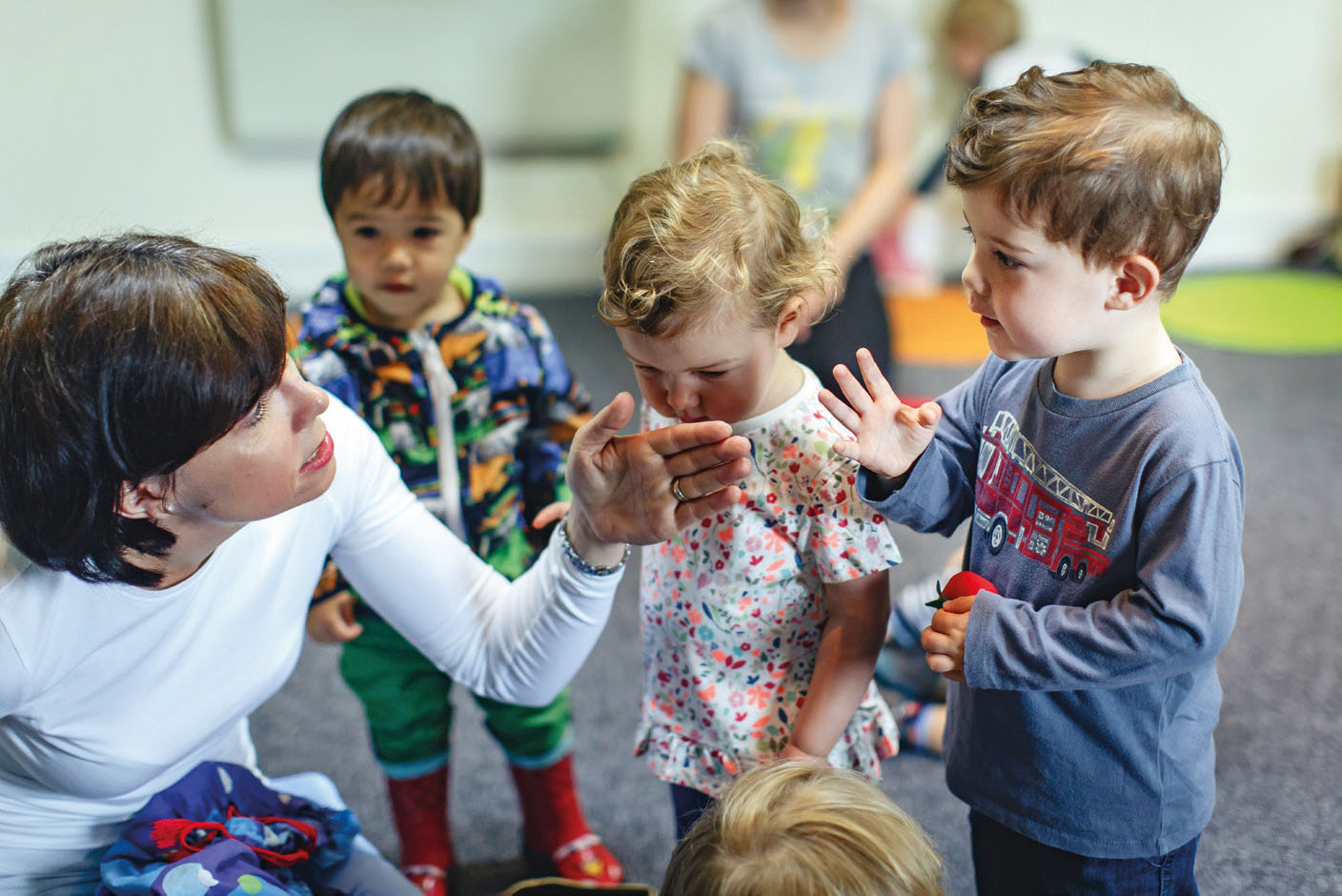 With Little Notes, the curriculum changes as children age (Image: Anita Momot)
With Little Notes, the curriculum changes as children age (Image: Anita Momot)
The Little Notes model seems to be very much founded in encouraging receptivity and response to music, and this appears to be an effective way of instilling a love of creativity in children from a young age. Bradbury tells me that the Little Notes pedagogy, while inspired in part by some of that of Kodály and Dalcroze, is, for the most part, developed from her and her husband's experience: ‘We have been running sessions for 13 years, working with thousands of families and performers.’
Some of the Little Notes musicians also offer an extended programme for school-aged children, and the initial Little Notes babies in West Sussex are now preparing for Grade 8 recorder. ‘We even run a choir for the adults that stopped attending classes when their children started school,’ Bradbury adds – a clear indicator that learning is a life-long investment, and that creativity is just as essential later in life as at the very beginning.
Music Bugs
‘Our strength as an organisation comes from our franchisees.’ This is Claire Bennett, the founder and director of Music Bugs, another EY music business with a franchise model in the UK. She prides Music Bugs for the trust it puts in the business owners that operate within its model, which she describes as allowing more flexibility than other ‘structured and rigid’ franchise models, which in turn gives owners the opportunity to manage a reactionary business that responds to local needs.
As the director of Music Bugs, Bennett's primary role is to support the franchisees who are hired to deliver the music sessions to families of children from the age of newborn to five, as well as continuing to develop the business model. ‘We also work within primary schools and EY setting with children up to the age of seven,’ she tells me.
And if Bennett isn't busy enough as the director of one of the largest music franchises in the UK, she is also the founder of World Nursery Rhyme Week, a global initiative that promotes the importance of singing rhymes in early childhood – ‘particularly in the development of crucial language and communication skills’. So while Bennett herself does not have a musical background – ‘I played the recorder at school, badly, and occasionally play the ukulele at home, also badly’ – she expresses a keen desire to share music education as widely across the UK as possible, and it is the franchise model of her business that allows this.
Eager from the offset to create classes for children where they could fully immerse themselves into the experience, Bennett says: ‘It was crucial to have the support and input of experienced musicians, particularly those with experience working within EY environments. We are very fortunate that, 15 years on, we still have the privilege of working with the same team; this means I can concentrate on the development and mentoring side of the franchise.’
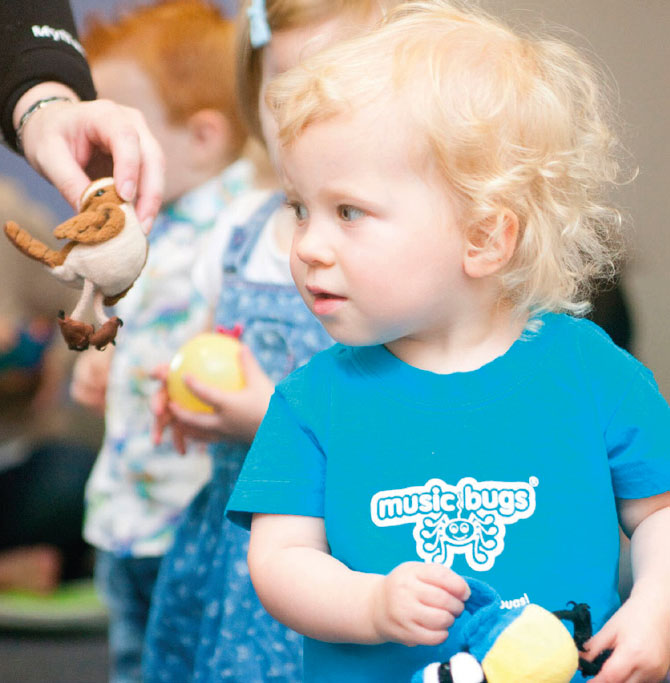
Watch the birdie! (Image Andrew Kelly Photography)
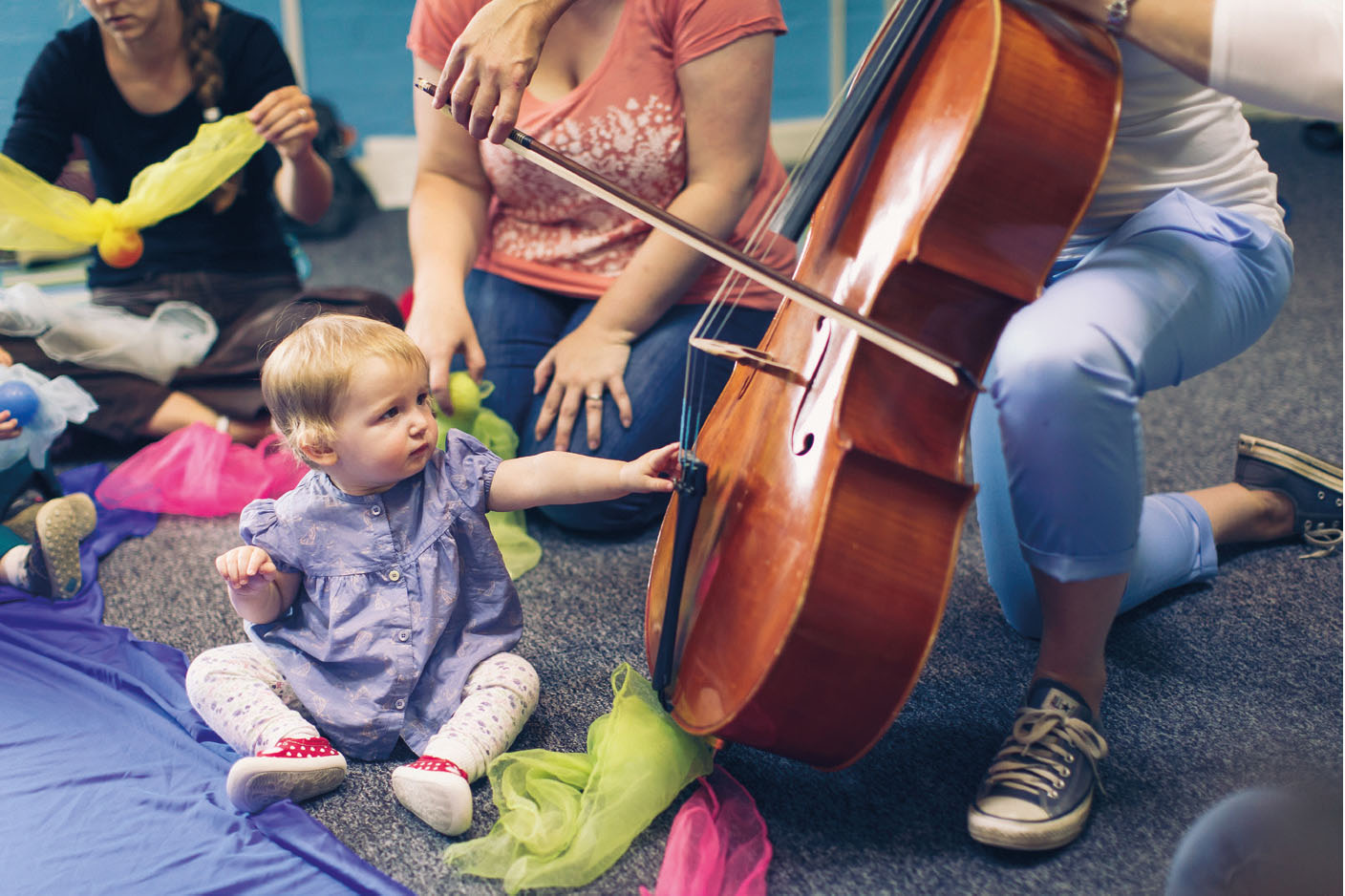 Hands on: Little Notes sees the value in demystifying music from an early age (Image: Anita Momot)
Hands on: Little Notes sees the value in demystifying music from an early age (Image: Anita Momot)
As for the pedagogy of Music Bugs, classes are multi-sensory and are split into three main age ranges: Baby Bugs, for newborn to crawling; Mini Bugs, for six to nine months; and Jumping Bugs, which is 18 months and beyond. ‘We also provide Family Bugs classes, which are a complete mix. These sessions tend to be very popular with our local families.’
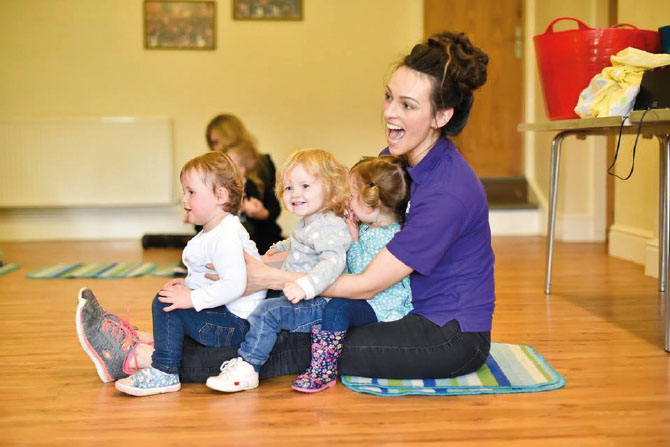
Physical activities can also promote musicality (Image: Andrew Kelly Photography)
As for the content, she tells me that, unlike Little Notes, it remains very similar through the different age groups. What sets them apart is how the content is adapted and presented, ‘and how the children and parents interact’. Bennett offers an example: ‘In a Baby Bugs class we might sing “Two Little Dickie Birds” using brightly-coloured finger puppets. In this age group we will focus on the physical contact between the parent and child, and will gently bounce or tap out the rhythm. In a Mini Bugs class, we begin to see the development of fine and gross motor control skills, and our toddlers are beginning to role-play and develop their vocabulary. In a Jumping Bugs class, the children really start becoming more confident and independent. They are physically equipped to be able to anticipate the rhythm and either join in with the actions, or play along with a percussion instrument.’
The multi-sensory teaching method is one that I have seen several EY music franchises – and EY music sessions in general – utilise. Monkey Music, for example, encourages movement as a response to music. Does Bennett believe this sensory experience is an important one for young children?
‘Babies and young children are naturally driven to learn and explore using every physical means possible,’ she says. ‘A multi-sensory environment is absolutely crucial at this early stage of life, and a lot of care and thought goes into planning our sessions to ensure that all children are provided with this opportunity.
‘When a child comes to one of our classes, we want there to be things they can not only see, but hear, touch and interact with, at a pace that is comfortable for them. We are firm believers in allowing children to physically engage in their environment.’ And, like Monkey Music, where movement is encouraged, Bennett says that in a Music Bugs classes, it is rare for a child to be asked to sit down or not touch something. ‘Provided they are safe, supervised and happy, we are happy too.’
A typical Music Bugs session involves a huge range of stimuli, from puppets and bubbles, to percussion instruments. ‘We may explore “Under the Sea” with a sensory play sheet or gallop our hobby horses around the room as we tap out the rhythm using claves or coconut shells,’ Bennett says, adding: ‘No two classes are ever the same, and our franchisees are always well equipped to deal with any theme, from dinosaurs to an African safari!’
More than anything, a desire to deliver high-quality musical experiences to young children must be a driving factor. It is, after all, a huge undertaking to set up a business, particularly where the main clientele are very young children.




